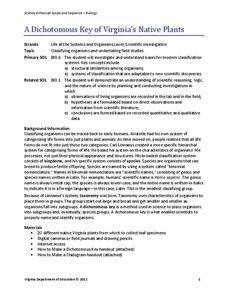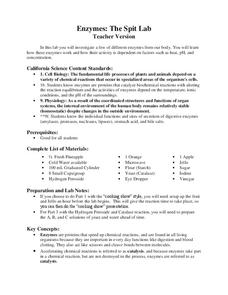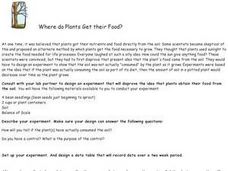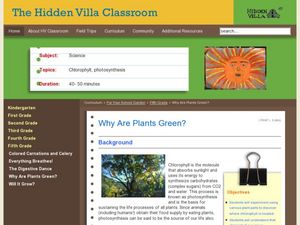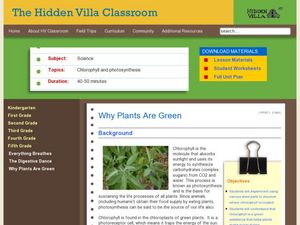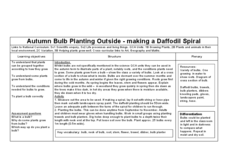Curated OER
Creatures of the Ocean
Second graders examine the characteristics of a specific ocean creature. In pairs, 2nd graders create a graphic organizer to list categories and supporting details of the ocean creature. Students review data and use it to write a report...
California Academy of Science
Composting: A Scientific Investigation: California Academy of Sciences
Garbage, recycle, compost: Does it really matter where we put our trash once we are done? By making detailed observations over seven weeks, kids will see which materials break down naturally to become a healthy part of the soil, and...
Curated OER
Models as Tools for Ecosystem Management
Fifth graders explore the concept of environmental management. In this ecosystem instructional activity, 5th graders discover how models help scientists learn more about managing ecosystems. Students create their own model, make...
Virginia Department of Education
A Dichotomous Key of Virginia’s Native Plants
Can your class correctly classify plant species? Individuals explore native plants of the local environment and correctly classify them into their respective categories. They investigate differences in the plants and discuss similarities...
Curated OER
Parts of the Flower and Pollination
Students review the parts of the plant and recognize the parts that are important for pollination. For this pollination lesson, students illustrate and label the parts of a flower. Students compare different types of flowers.
Curated OER
Living-Nonliving
Young scholars determine that environments have living and nonliving parts. They discuss what makes something a living thing and something a nonliving thing. They make a chart and list characteristics of living things and nonliving things.
LABScI
Botany: The Plant Dissection Lab
Study everything about plants! The 12-part series of lessons continues with an examination of many aspects of plants. Components of the laboratory activity address the growth and structure of plants by evaluating familiar plants. The...
LABScI
Enzymes: The Spit Lab
Enzymes in our bodies each have a job to do. Learn the factors that affect the activity of some enzymes using the third activity of an informative 12-part biology series. A three-part laboratory activity asks teams to investigate how...
LABScI
Photosynthesis: How Do Plants Get Energy?
Examine the mechanism of photosynthesis through different light scenarios. Pupils vary the amount and type of light exposure on plant leaves in the fifth lesson plan in a 12-part series. Through observation, they determine the rate of...
Curated OER
THE CELL: DESIGN AND FUNCTION
After studying the structure and functions of living cells using textbooks, internet or encyclopedias, students prepare a PowerPoint presentation on cell structure and present it to the class.
Curated OER
Where Do Plants Get Their Food?
Plants need food to survive, just like any other living organism. Young biologists analyze an experiment performed in 1610 by Jan van Helmont to determine if plant nutrition is obtained through the soil. First, lab groups work together...
LABScI
Cell Diffusion and Permeability: The See-Thru Egg Lab
Create a model to study a microscopic phenomenon. The seventh of 12 lessons uses an egg (without its shell) to represent a cell membrane. Using different solutions, learners explore the concept of cell diffusion. They monitor...
Curated OER
Why Are Plants Green?
Young scholars smash plant parts and wait for visibility of chlorophyl to show why plants turn green. In this green plants lesson plan, students use acetone and filter paper for this experiment.
Curated OER
Populations – The Survival of the Fittest (Part 1)
Students explain in their own words why organisms live together. In this biology lesson, students model what happens to organisms if their environment changes. They explain the importance of evolution.
Curated OER
The Way a Tree Works
Students explore nature by conducting botany experiments. In this plant life instructional activity, students define the necessary resources for a plant to thrive on our planet while defining scientific vocabulary terms. Students utilize...
Curated OER
Let's Sort a Salad
Students examine edible plants by identifying salad ingredients. In this botany instructional activity, students discuss the different vegetables that can be eaten in a salad and draw them on a worksheet. Students review vegetable...
Curated OER
The Discovery of Photosynthesis
Students explore how scientists discover photosynthesis. In this biology lesson, students identify the basic requirements for photosynthesis to happen. They recreate past scientists' experiments and record their observations.
Curated OER
The Carbon Cycle
In this carbon cycle worksheet, students will read about the carbon cycle and study a diagram showing what creates carbon dioxide and what uses carbon dioxide. Students will then complete 4 short answer questions.
Curated OER
It's Challenging Being Green!
Students influence the plant life cycle as they take care of plants.In this caring for plants lesson, students understand the parts of the plant and their functions in keeping it alive. Students participate in experiments with plants and...
Curated OER
Why Plants Are Green
Students discover the properties of chlorophyll in plants. In this plant biology lesson, students conduct an experiment to find where the chlorophyll in the plant is located. Students are split into small groups and study plant parts....
Curated OER
Standard 4-Ecosystems
In this ecosystem worksheet, students answer questions about energy pyramids, food chains, consumers, producers, decomposers, biotic and abiotic factors in an environment, natural selection and the importance of biodiversity in an...
Curated OER
Chemical Energy
In this science worksheet, students read about enzymes and nutrition. Students also answer 2 comprehension questions about the reading.
Curated OER
Autumn Bulb Planting Outside - Making a Daffodil Spiral
Students plant daffodil bulbs. In this gardening activity, students work outside to plant daffodil bulbs in the autumn so that they can grow roots and emerge by spring.
Curated OER
Pump It Up!
Students design a pumping device that will effectively pump fluid through a model "cardiovascular system." They explore the effects of too much and too little pressure on a circulatory system.





